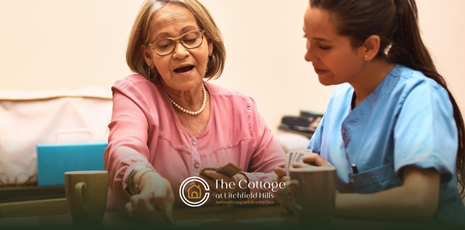A Closer Look at the Services Included in Assisted Living

Key Highlights
- Assisted living communities offer tailored care plans, ensuring support aligns with individual needs and preferences.
- These facilities assist with daily tasks like bathing, dressing, and medication management, creating a stress-free living experience.
- Residents enjoy social activities, recreational programs, and wellness initiatives that foster engagement and improve overall well-being.
- Many assisted living facilities provide specialized services such as memory care for those with cognitive impairments.
- Comfortable living spaces, including private or shared accommodations, enhance residents' quality of life.
- Assisted living bridges the gap between maintaining independence and receiving skilled nursing care.
Assisted living provides older adults with freedom and essential care. These facilities assist with daily tasks while ensuring personal care for safety and health. In addition to physical support, they offer nutritious meals and promote social engagement for a better quality of life. Among senior living options, assisted living stands out for its balance of support and enjoyment, giving families peace of mind about their loved ones' well-being.
Understanding Assisted Living Communities in the United States
Assisted living has significantly expanded in the United States, becoming one of the most flexible options for seniors. These facilities cater to older adults who need some assistance while prioritizing a safe and supportive environment.
The focus is on personalized care tailored to individual needs. Assisted living offers programs that promote activity and well-being, including medication support, wellness activities, and social events. Designed to balance personal care with community engagement, assisted living allows residents to maintain independence while ensuring safety and support, making it an excellent choice for families seeking a nurturing environment for their loved ones.
Defining Assisted Living and Its Purpose
Assisted living is designed for seniors who need help with daily tasks but do not require nursing home care. It supports older adults who cannot live independently, yet don't need extensive medical assistance.
The primary goal of assisted living is to provide personalized care tailored to individual needs. Staff assist with grooming, dressing, medication management, and household chores, enhancing residents' quality of life.
What sets assisted living apart is its focus on maintaining independence while ensuring safety. Daily tasks are simplified, fostering a strong sense of community through wellness programs, events, and social gatherings. This approach emphasizes respect, genuine connections, and active engagement in life.
Who Benefits Most from Assisted Living?
Assisted living is ideal for older adults who wish to maintain independence but struggle with daily tasks like cooking, bathing, or managing medication. These facilities provide the necessary support while encouraging self-sufficiency.
For seniors with mobility or health issues, assisted living offers reassurance with caregivers always nearby. This presence enhances their daily lives by ensuring safety and comfort.
Additionally, assisted living combats loneliness through planned activities and social events, fostering connections among residents. Overall, it creates a safe and nurturing environment that addresses the physical, social, and emotional needs of older adults.
Core Services Provided in Assisted Living
Assisted living focuses on providing a range of services to ensure individual well-being. Each resident receives a personalized care plan that addresses their daily needs and health monitoring.
Key services assist with daily activities, including grooming, medication management, and housekeeping. Beyond physical care, these facilities foster social connections through events and offer meals tailored to dietary requirements.
The goal of assisted living is to promote comfort, safety, and independence while providing necessary support.
Assistance with Activities of Daily Living (ADLs)
Many older adults struggle with daily tasks, making assisted living essential. Residents receive personal care, bathing, dressing, grooming, and meal preparation, enhancing their independence and quality of life.
With tailored support, residents engage in enjoyable activities and social interactions, reducing loneliness and enriching their experience. Daily tasks become manageable, helping older adults feel more at home.
Medication Management and Health Monitoring
In assisted living, ensuring medication adherence and health monitoring are crucial. Many seniors struggle with medication schedules, so well-trained staff help them take their medicine correctly and on time.
Health checks are also vital. On-site healthcare professionals address health concerns promptly, while staff coordinate with specialists to ensure continuous care.
Some facilities offer wellness programs to prevent health issues, including fitness classes and nutritional guidance. This approach promotes residents' well-being and provides peace of mind for families, knowing their loved ones' health is consistently monitored.
Amenities and Lifestyle Enhancements
Assisted living goes beyond care; it enhances quality of life. These facilities are designed for comfort and well-being, providing various features that enrich residents' experiences.
Residents have options, choosing between private and shared rooms based on their preferences. Each room includes safety features like emergency systems. Shared spaces facilitate group activities, while outdoor paths and on-site dining foster community. By combining health support with life's simple pleasures, assisted living creates a warm and welcoming environment.
Private and Shared Accommodations
Assisted living accommodations cater to diverse needs, offering both private apartments and shared spaces designed for safety, comfort, and accessibility.
| Feature | Private Apartments | Shared Spaces |
|---|---|---|
| Privacy Level | Complete privacy | Shared with others |
| Amenities Included | Kitchenette, private bath, décor | Access to common areas |
| Suitable For | Independent seniors | Those who value companionship |
Private apartments provide maximum independence with personal kitchens and baths. Shared spaces foster community while allowing for personal space. Assisted living offers both options to accommodate varying needs and care levels.
Nutritious Dining Options and Meal Planning
Good food is very important for the health and happiness of older adults. In assisted living communities, people get meals that are made to be both tasty and good for them. Chefs make menus that fit the needs of senior care, taking care of special diets and always focusing on health and taste.
In many communities, older adults can help or give ideas about what is served. Sometimes, they have cooking demos or events that make meals fun for everyone. People can choose when to eat, enjoy special themed nights, or go to nice dinners that help them meet others.
With these healthy meals and meal plans made only for them, residents in assisted living do not have to worry about making their own food. They still get what they need for a healthy life.
Social, Recreational, and Wellness Programs
Assisted living places focus on helping people feel well as much as caring for them every day. They have different wellness programs and fun activities made for each person. This keeps residents active and helps people stay connected with others.
These programs have group talks, planned social events, and exercise times. All of these help with both mind and body health. Wellness programs make sure that people have interesting things to do and feel that their lives have meaning. When residents get chances to take part in things, assisted living gives them a strong sense of community in a safe and happy place.
Organized Activities and Community Events
A wide range of planned activities and community events gives older adults chances to be social and live a fulfilling lifestyle. These activities help with social interaction and can lessen feelings of loneliness. They also help build a strong sense of community. People can join fitness classes or art workshops that let them enjoy their interests and get to know others. These meaningful activities make daily life better and help the overall well-being of each person. The supportive environment makes sure that individual needs are taken care of.
Physical Fitness and Wellness Initiatives
Taking part in physical fitness and wellness programs is very important for older adults in assisted living. These programs often give fitness classes that fit different needs. They help improve physical health and also let people get together and enjoy each other's company. This social engagement helps boost the quality of life for everyone.
The programs support all residents. Each person can find activities that match what they can do. When people join in often, they build a strong sense of community. This helps people make friends and spend time together. It also fights off feelings of loneliness and supports an active, happy daily life.
Tailored Services That Support Comfort and Independence
Assisted living communities are designed to support older adults in living healthier, more fulfilling lives. With personalized care plans, engaging social activities, and a strong focus on health and wellness, they meet evolving needs while promoting independence and connection.
At The Cottage at Litchfield Hills, assisted living is designed with comfort, convenience, and personalized care in mind. Residents enjoy a range of services that support both independence and well-being. Complimentary transportation makes it easy to get to appointments, run errands, or attend local events without the stress of driving.
We also offer apartment styles in every size to suit different preferences and needs, along with personalized wellness plans tailored to each resident’s health goals and care requirements. It’s all part of our commitment to creating a supportive, enriching environment where seniors can thrive. Contact us today!
Frequently Asked Questions
What is typically included in assisted living services?
Assisted living services aid individuals with daily activities and offer social events, wellness programs, specialized memory care, transportation, and concierge services. These offerings enhance residents' quality of life, promoting independence and community engagement through everyday support and social interaction.
How does assisted living differ from nursing homes?
Assisted living allows individuals to maintain independence while receiving help with daily activities as needed. In contrast, nursing homes provide extensive medical care and continuous staff supervision for those with serious health needs. This distinction affects personal freedom and the types of services available.
Are residents able to maintain independence in assisted living?
Yes, individuals in assisted living can maintain significant independence. Staff provide necessary support while allowing residents to manage daily activities independently. This balance preserves their freedom and enhances quality of life, as personal choice is crucial for well-being in such settings.
Sources:
- https://www.ncoa.org/article/the-top-10-most-common-chronic-conditions-in-older-adults/
- https://www.health.harvard.edu/blog/two-thirds-of-seniors-need-help-doing-one-or-more-daily-activities-201312136942
- https://www.myplate.gov/life-stages/older-adults
- https://www.ncoa.org/article/exercise-programs-that-promote-senior-fitness/






